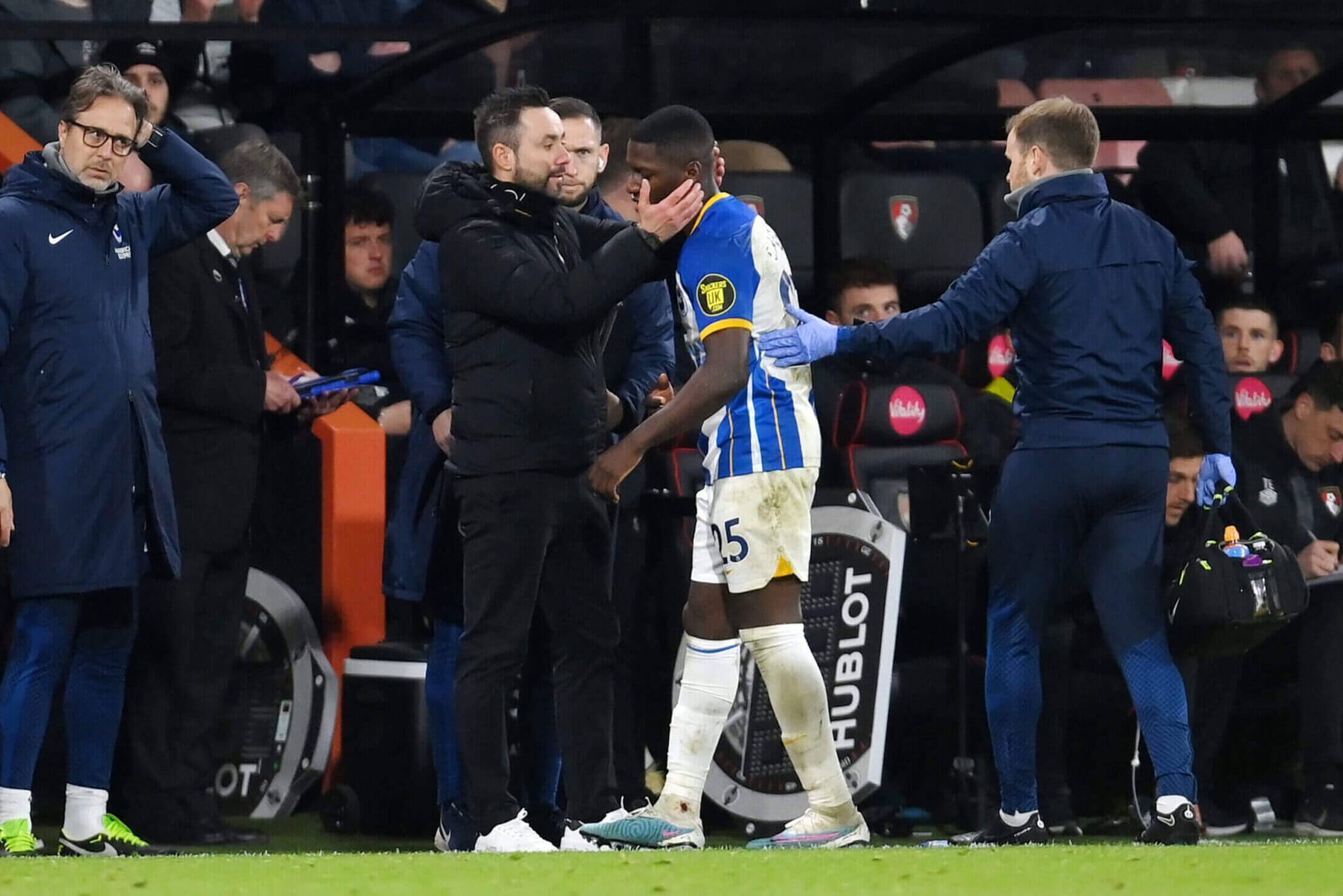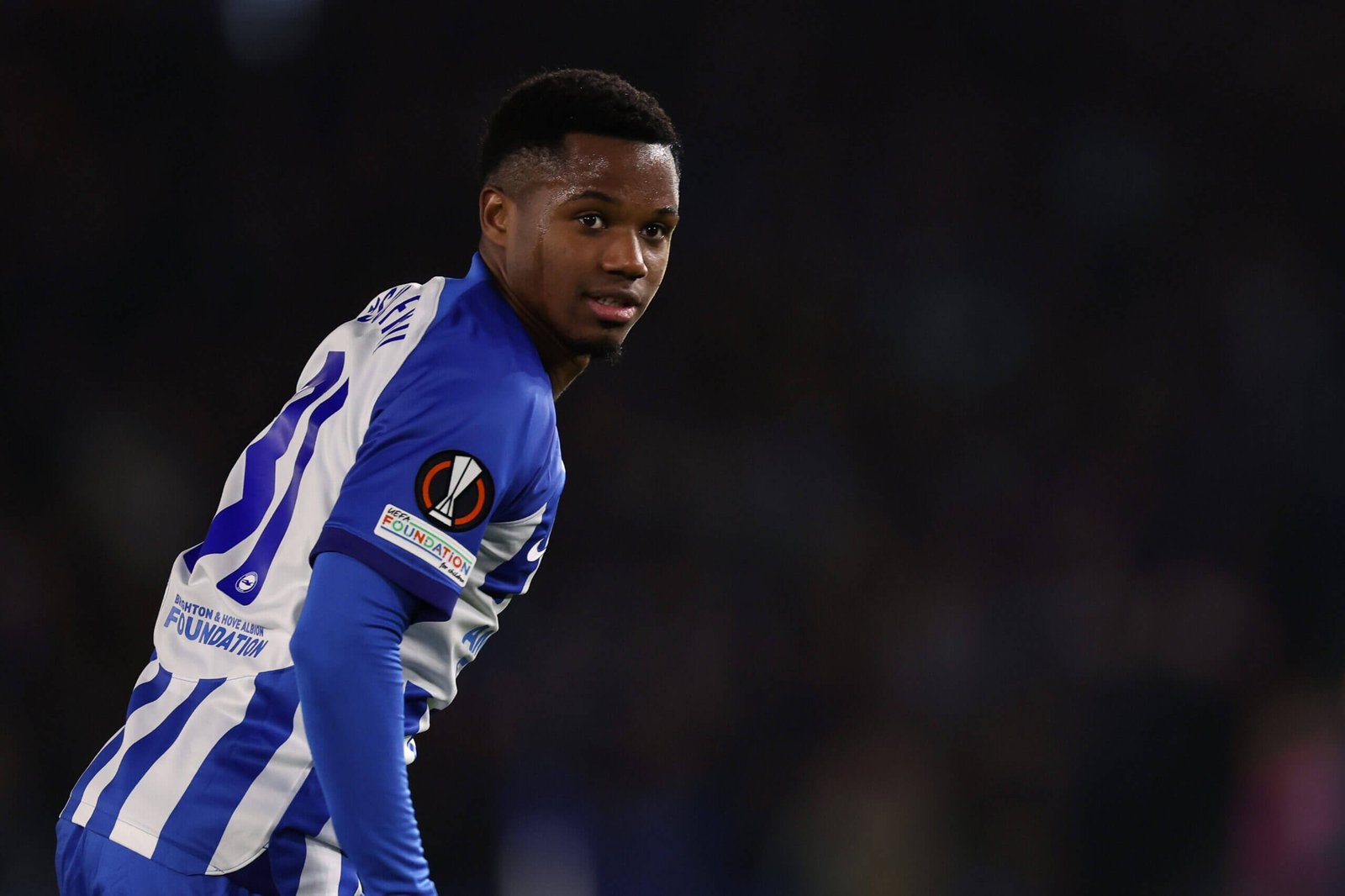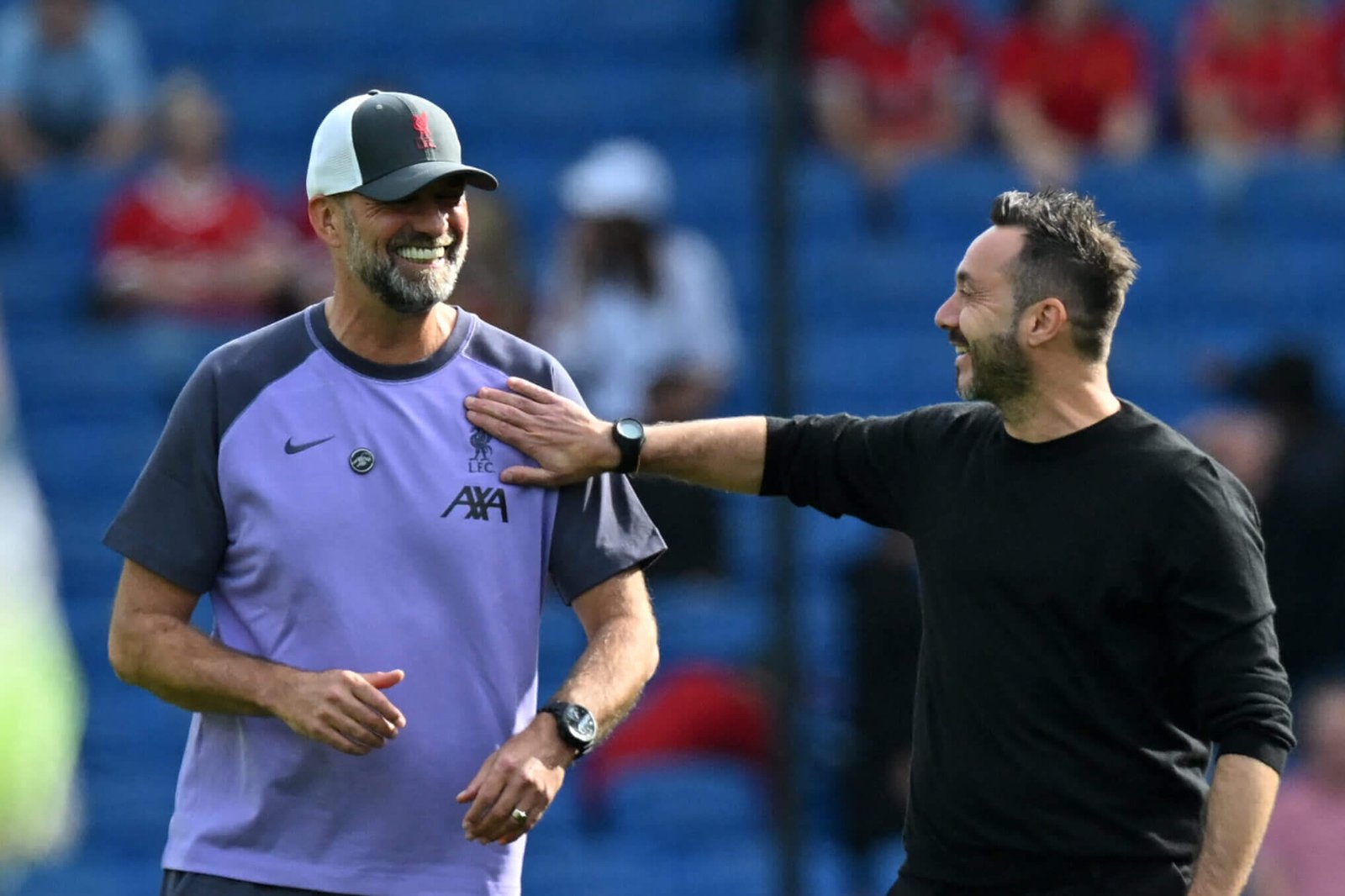There was a time not long ago when Roberto De Zerbi looked destined to dine at one of Europe’s top tables. But as he drank beer and ate sandwiches after his final match in charge of Brighton & Hove Albion, he could be forgiven for wondering what’s next on the menu.
Last year, De Zerbi was seen as one of the most sought-after coaches in football. Having led his side to an FA Cup semi-final and secured European football for Brighton for the first time in their history, it seemed he could do no wrong.
“He is one of the coaches and managers that I enjoy most in worldwide football,” Pep Guardiola, arguably the game’s leading coach, said in October.
The feeling within the industry was that it would only be a matter of time before one of the elite clubs in England, Spain, Germany or Italy came calling. Brighton did not have to fend off suitors over his 18 months at the Amex, but when Liverpool stepped up their search for Jurgen Klopp’s successor, De Zerbi was among the names shortlisted before they opted for Feyenoord’s Arne Slot.
De Zerbi has also missed out on vacancies at clubs including Ajax, AC Milan and Bayern Munich, who have eventually turned to Vincent Kompany, manager of the relegated Burnley side that finished 24 points behind Brighton.
But now the 44-year-old is out of work, with Chelsea in the market for a new coach after the departure of Mauricio Pochettino and Erik ten Hag’s future at Manchester United still unclear pending the conclusion of an internal review by new minority owners INEOS.
And while his reputation for coaching excellence endures, De Zerbi’s public persona has been noted by some prospective employers. Was it, for instance, a wise idea to question Brighton owner Tony Bloom in a press conference?
After a 4-0 defeat to Roma in the Europa League in March, De Zerbi said he would need to understand the “Tony plan” before making any decision about whether or not to extend a contract that was due to expire in 2026.
“I believe tonight will teach the entire club,” he added. “From the president… It was also his first time (the president) faced this competition, so he’ll also improve in the future in organising everything that the team needs to be better.”
For some answers he gives to the media, De Zerbi uses a translator and there is sympathy that, owing to English not being his native language, his words can sometimes be misinterpreted or do not include sufficient nuance. But numerous people familiar with the matter — who, as with others in this article, are speaking on condition of anonymity to protect relationships — have indicated De Zerbi was reminded about being more careful when making such comments publicly.
His words after the Roma defeat also reflect the main difference of opinion he had with Brighton, which was over recruitment.
A particular bone of contention for De Zerbi was the club’s lack of business in January. Brighton’s squad has suffered from injuries to key players, such as Kaoru Mitoma, Solly March and Pervis Estupinan, which came after the exits of Alexis MacAllister and Moises Caicedo last summer. Yet only Valentin Barco, a 19-year-old left-back, and Adrian Mazilu, an 18-year-old right-winger, joined the club in January, costing Brighton just over £10million ($12.7m) in total.
On January 1, Brighton were eighth in the Premier League, one place behind Manchester United and had a game in hand over Ten Hag’s side. Five months on, they finished 11th on 48 points, one point behind rivals Crystal Palace, and lost more top-flight games (14) than they won (12).
De Zerbi oversaw only four Premier League wins in 2024. Yet, in the end, the parting of ways was relatively amicable.
On Tuesday, May 14, De Zerbi, Bloom, chief executive Paul Barber and technical director David Weir went for an evening meal in Brighton. The club’s transfer and pre-season plans were discussed. The dinner ended with warm goodbyes and, by the Friday, it was mutually agreed for both parties to go their separate ways. De Zerbi informed the players after training on Saturday that he was going to be leaving.
Following their 2-0 defeat by Manchester United in his final game on Sunday, May 19, De Zerbi addressed Brighton supporters inside the Amex Stadium and thanked Bloom publicly.
De Zerbi saying goodbye to Brighton after the United loss (Charlie Crowhurst/Getty Images)
“I’m sad but I know life and I know what I want to do in my life, and it is good like this, I think,” De Zerbi said.
He added in his post-match press conference that he has not got another job lined up. Those familiar with the matter indicate that he has not taken a pay-off and Brighton will be in line for compensation if he immediately joins a new club.
Those close to De Zerbi say this reflects the character of a man who is motivated chiefly by football rather than the monetary rewards it brings. And while the Italian can be as animated behind the scenes as he is on the touchline, the tensions he creates are natural in football — if not always in English football.
“A lot of time, I’ve been in disagreement with my owners, but anyway a lot of owners (still) called to speak with me, to speak about football with me,” De Zerbi said. “I follow myself, my history, what my family teach me. I want to be loyal to my history, my values.”
But the question is where does this leave the reputation of one of football’s most admired coaches and a man who is suddenly on the market again?
After qualifying for the Europa League last season, De Zerbi wanted to carry that momentum into the summer transfer window.
Yet, Caicedo joined Chelsea for a fee that could rise to £115million, and Mac Allister, another crucial midfielder, left for Liverpool in a deal worth an initial £35million.

De Zerbi with Caicedo in April 2023 (Getty Images)
In their place, James Milner, then 37, arrived from Liverpool as a free agent, and Carlos Baleba signed from French club Lille for just under £26million. Baleba is the club’s second-most expensive purchase, with Joao Pedro the most after joining from Watford in a deal worth £30million.
Despite setting two new transfer records in terms of cash spent on a single signing, De Zerbi was not convinced his squad was in a stronger position.
The Italian is not one to stand still; his personality, intensity and ambition is what turned him into a coach linked to the biggest jobs in Europe. He felt the players brought in were developmental signings who would come good over time as opposed to making an instant impact, such as Mohammed Kudus, the talented attacking midfielder who ended up signing for West Ham from Ajax last summer in a deal worth £38.2million, or Fred, who joined Fenerbahce from Manchester United last summer at the age of 30.
De Zerbi is specific about what he wants — be it a left-footed player or one that is excellent in one-on-one situations — and that is where the issue lies. De Zerbi wanted more players with established records, who would cost more in transfer fees, wages or both.
Brighton did bend to De Zerbi’s demands when it came to Ansu Fati and Mahmoud Dahoud, yet both signings have failed to make any kind of impact.

Fati joined from Barcelona (Matthew Ashton/AMA/Getty Images)
Fati, 21, joined on a season-long loan from Barcelona, with Brighton paying 80 per cent of his salary — a weekly contribution of £128,000, which was a lot more than any other member of De Zerbi’s squad. Dahoud, released by Borussia Dortmund as a free agent last May, joined Brighton as one of the club’s highest earners. But by February, he was out on loan at Stuttgart.
It was a similar story for De Zerbi during the winter transfer window. Senior figures at Brighton were expecting all of the injured players to return, so going into the market to fill the gaps would create a bloated squad. But De Zerbi felt it would still take them time to get those recovering players up to full speed and any further injuries could derail their season if they did not act.
His worst fears came true as Joao Pedro (hamstring), Mitoma (back), Julio Enciso (knee), Jack Hinshelwood (foot), Estupinan (ankle) and Evan Ferguson (ankle) all suffered injuries in the final months of the season — players who were central to De Zerbi’s style of building from the back, baiting the opposition and exploiting the space left by the opposition.
Barco only started his first league match in April’s 4-0 defeat at home to Manchester City, while Mazilu was sent on loan to Vitesse Arnhem in the Netherlands. Brighton also completed the signing of Ibrahim Osman from Danish club Nordsjaelland for around £16million in February, with the winger due to arrive once the summer transfer window opens.
Brighton sign youngsters at relatively low cost from all over the world. They are identified by a combination of Bloom’s global data bank and the club’s scouting network. But this long-term approach frustrated De Zerbi, who believed that money for developmental signings was being used from a transfer budget that could have instead been spent on more established players.
The issue with that line of thinking, however, is that he agreed to become Brighton’s head coach knowing that is how they operate as a club.
Brighton know what has made them successful and were not prepared to throw years of great work at extracting the most out of transfer windows away. And Bloom doesn’t operate from a budget; due to Brighton’s healthy financial position, each signing is decided on an individual’s merits.
Ultimately, Bloom has the final say on any signings — and some of the players De Zerbi wanted did not fit Brighton’s model.
When De Zerbi first arrived in September 2022, his training sessions were “baffling”, according to Brighton captain Lewis Dunk.
“The first meeting when he went in, I was so confused — who to look at, what to listen to — but you slowly pick up. Basically, don’t listen to the manager, wait for the translator to speak and you get there in the end,” he reflected earlier this season.
“Training changed dramatically, we worked on a lot of different stuff and the first couple of weeks were a really hard transition. We were fourth in the league when Graham (Potter, De Zerbi’s predecessor) left and we were flying with him and it was a strange time for him to go, and then Roberto came in and it was a carnage two weeks.”
Dunk ended up seeing football “in a completely different way” and other players were also impressed with what De Zerbi taught them. The result was a style of play that brought admiration from his peers.
In March, Klopp praised the “incredible job” De Zerbi was doing, saying: “It’s a different game against Brighton. We were the first opponents (a 3-3 draw at Anfield) when Roberto arrived and we had no idea what to expect. It was quite impressive how quick he got the team playing in his way. Since then, it only got better.”

De Zerbi and Klopp last October (Glyn Kirk/AFP via Getty Images)
Likewise, Guardiola often speaks highly of the former Brighton coach. “I’m a spectator mainly as a manager and I enjoy a lot watching his teams play,” said the Manchester City boss. “I learn, like it and what he does makes sense.”
Yet there were times in his final season when it did not always make complete sense. Barco, for example, was thrown in at the deep end in that loss to City, while Fati has been consigned to a role from the bench since making his return from a calf injury at the end of January.
Joao Pedro’s reaction when De Zerbi spoke to him after he was taken off in the 88th minute away to Bournemouth on April 28 suggested he was less than impressed, and De Zerbi replaced Mark O’Mahony, a 19-year-old striker making his first Premier League start, at half time in that 3-0 defeat.
One person who heard the shouting in the Brighton dressing room at full time at Bournemouth described it as “incredible”. And addressing the media after speaking to his players, De Zerbi apologised for the club’s performance at the Vitality Stadium.
“We are not able to give our best — and our best is not enough,” he said. “We have to find the energy to finish the season in a different way. It is injuries, and motivation as well. Motivation is 80 per cent of our work.”
Brighton would not have made such the decision of parting with De Zerbi unless they were confident of getting his replacement through the door.
Even before an agreement was reached with the Italian, the club had identified who his successor would be — not that this is always a guarantee they get their first choice.
Barber famously has two computers on his desk and one of them contains a list of managerial and executive replacements.
Ipswich Town’s Kieran McKenna has been earmarked and has a release clause of around £5million. Ipswich’s owners, the U.S-based investment group Gamechanger 20, are ambitious and will want to keep McKenna, who held talks with Manchester United representatives last week but is now no longer under consideration for the Chelsea job.
There is no denying Brighton’s season would look different without the injuries, while it is also true that De Zerbi has not become a bad coach overnight. However, over the last few months, he has watched jobs he would have been in the frame for this time last year come and go.
There was a real danger that what looked to be a perfect marriage between himself and Brighton may turn into one of convenience. But for both parties, it was a relationship neither wanted to continue.
(Photos in top design: Getty Images; designed by Eamonn Dalton)
Read the full article here


